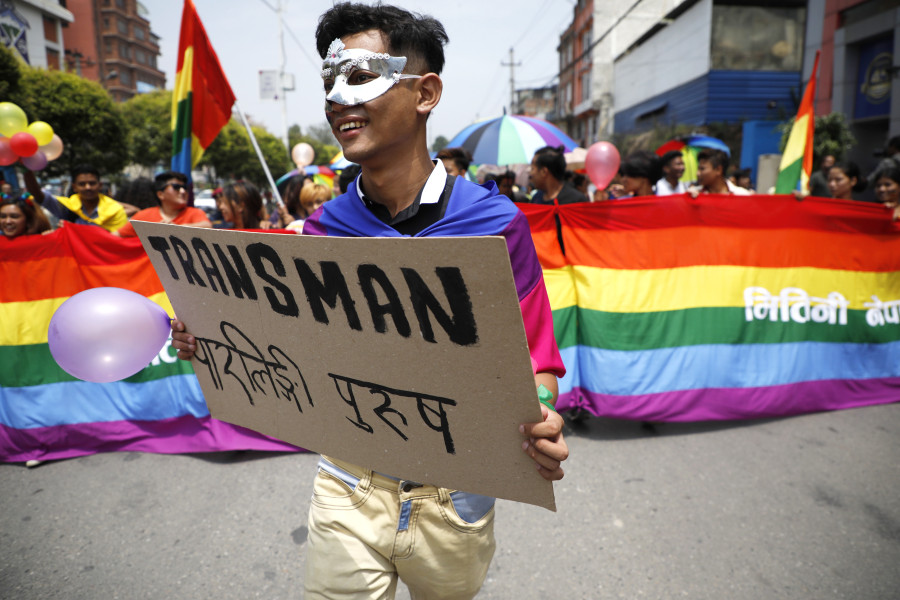National
Despite visibility for the LGBTIQ community, societal acceptance remains difficult
Many queer individuals still hesitate to come out publicly because they are afraid of stigma and discrimination
Shikha Neupane & Diya Rijal
Sita has known she was bisexual for a long time, but it was just two years ago that she was able to tell her close friends about her sexual orientation. She doesn’t know when she will be able to tell her parents and her family members. Despite the acceptance she has received from her friends, she still fears what her close family members might think and how they might react when she ‘comes out’.
“It’s not a pleasant world we live in. I’m not out completely because I’m scared,'' said Sita, not her real name as she didn't want to be identified publicly.
Even when she told her friends, she did it in an informal manner.
“It’s risky, but that way I can play it off as a joke if the conversation goes badly,” she said.
Like Sita, most members of the LGBTIQ community in Nepal remain closeted in fear of societal stigma and possible discrimination. Despite all the progress that Nepal has made in recent decades when it comes to ensuring the rights of the queer community, social stigma remains.
But the queer community is attempting to challenge this stigma in many ways, most recently by organising Nepal’s very first pride parade. Although pride marches have taken place for over a decade on the occasion of Gaijatra, Saturday saw Kathmandu’s first pride parade to mark the pride month. But things remain difficult.
“No matter how much visibility there is and educating we do, we all know that it simply won’t be enough,” said Lex Limbu, a popular UK-based blogger who came out as gay publicly in 2018 via a video. “There are days when I am super enthusiastic and positive about the younger generation and then I see some things online and it just makes me wonder whether we really are welcoming.”
Over the decades since Sunil Babu Panta became South Asia’s first openly gay lawmaker, Nepal’s LGBTIQ community has become much more visible in the mainstream.
Activists like Bhumika Shrestha, the first person to travel abroad with a passport under the ‘O’ category, have won plaudits across the world. Popular singer Sajjan Raj Vaidya’s video for Hattaridai, Batasidai was a sensitive portrayal of a gay couple, including a same-sex kiss scene. Transgender model Anjali Lama recently won ‘model of the year’ recognition at Grazia Millenial Award in India. And Kathmandu’s first drag show was hosted at Pink Tiffany, an LGBTIQ-friendly bar run by Meghna Lama, a transgender model.
But despite visibility, broad societal acceptance has been slow to come.
“It’s great that people are celebrating pride,” said Sita. “Even though homosexuality was legalised years ago, the society we live in isn’t always nice to people who are different.”
Rukshana Kapali, a transgender activist, documents her life and thoughts through her blog and lists many moments that exemplify what Sita believes.
“Being teased on the streets used to be most embarrassing moment. Those days were horrifying,” wrote Kapali on her blog Rukuchee Blog,
Kapali has come out publicly to everyone, including her family. Her family took some time to understand, but they eventually supported her and her activism for the LGBTIQ community.
For activists like Kapali, it’s not just about visibility.
“We also need to be at the decision-making level,” said Kapali. “It is always straight-cis people making decisions for us.”
And things continue to remain difficult for queer individuals.
Kim Thakuri, 21, came out to her mother when she was 18. Thakuri, who is transsexual and prefers the 'they' and 'them' pronoun, opened up to their friends a year ago. But they have not been able to open up to the father's side because of the possible reactions they may face.
"They don't really understand sexual identity and gender forms," said Thakuri.
They say that the lack of knowledge and ignorance is why people are homophobic.
"No matter how open your family is, you can never know the reaction. Telling someone that their view of you is different is a lot to process,” said Thakuri. "After the initial shock, it’s a make-it-or-break-it moment. Positive reactions can make you talk openly about your sexuality while negative ones can leave you reserved."




 14.24°C Kathmandu
14.24°C Kathmandu















